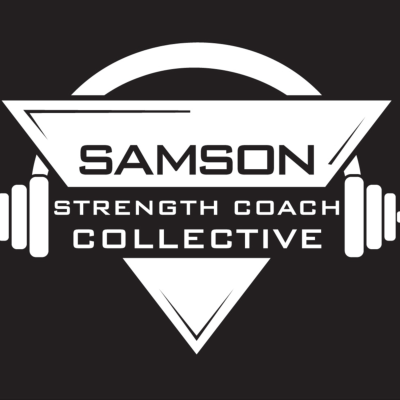
Samson Strength Coach Collective
inglés
Tecnología y ciencia
Disfruta 30 días gratis
4,99 € / mes después de la prueba.Cancela cuando quieras.
- 20 horas de audiolibros / mes
- Podcasts solo en Podimo
- Podcast gratuitos
Acerca de Samson Strength Coach Collective
Samson Strength Coach Collective is created with coaches of all levels in mind! We want it to be a resource for coaches to be able to learn and grow all year round. With a great network of coaches to lean on, this will allow us to raise the standard in our industry! Nothing like some shop talk that leads to coaching gems to enhance your career.
Todos los episodios
241 episodiosBuilding NBA Toughness with Bill Foran
In this episode of the Samson Strength Coach Collective, Bill Foran—former Head Strength and Conditioning Coach of the Miami Heat—walks through his decades-long career in sports performance. Bill discusses his transition from college athletics to the NBA, the cultural standards that defined the Heat organization, and how quality equipment and strong relationships shaped athlete development. He also offers candid advice for young coaches navigating a rapidly evolving profession. Key Takeaways * Building culture is just as important as building strength * Early NBA strength coaches helped define today’s performance standards * Quality, customizable equipment plays a major role in athlete development * Trust is earned through consistency, care, and work ethic * Modern athletes require variety while still mastering fundamentals * Mentorship remains a cornerstone of coaching growth * Strength and conditioning continues to evolve with technology and specialization Quote: “You gotta care and work with them.” — Bill Foran
The Evolution of Strength & Conditioning with Doug Briggs
In this special 50 Year Legacy Series episode of the Samson Strength Coach Collective, Doug Briggs shares decades of perspective on the evolution of strength and conditioning. Doug breaks down how training philosophies have shifted, the growing focus on injury prevention, and the cultural changes within gyms. Drawing from personal experience, he explains why returning to basic training principles may be essential for developing stronger, more resilient athletes—while honoring the role Samson Equipment has played in shaping training environments over the last 50 years. Key Takeaways: * Strength and conditioning has evolved significantly over the past five decades. * Injury prevention has become overemphasized at the expense of performance. * Training has shifted away from large, compound movements. * The late 80s and early 90s marked a turning point in coaching philosophy. * Balance-focused training is not universally beneficial. * Foundational training methods are regaining importance. * Training intensity was higher in previous generations. * Gym culture and etiquette have changed dramatically. * Anecdotal coaching experience still provides valuable insight. * Samson Equipment has played a meaningful role in the 50-year evolution of training spaces. Quote: “We train too much to prevent injuries.”— Doug Briggs
50 Years of Strength: Scott Warman & the Samson Legacy
As part of the Samson Legacy Series celebrating 50 years of Samson Equipment, Scott Warman joins the Samson Strength Coach Collective to share stories from his pioneering career in strength coaching. Scott discusses the evolution of training across sports, the importance of safety in the weight room, and the innovations in equipment design that helped establish Samson as an industry leader. He also reflects on his long-standing relationship with Dave and Linda Schroeder, whose integrity and vision have been central to Samson’s longevity and success. Key Takeaways: * Scott Warman is a pioneer in strength coaching with a deep industry history * Samson Equipment has evolved significantly over the past 50 years * Safety in the weight room is critical to long-term athlete development * Innovative equipment design has always set Samson apart * Dave and Linda Schroeder’s leadership shaped Samson’s foundation * Strength training is now widely accepted across all sports * Early strength coaches faced skepticism and limited resources * Samson’s legacy is rooted in integrity and quality * Scott’s passion for strength training remains strong * The bond between Scott Warman and the Schroeder family defines the Legacy Series Quote: “I’m gonna keep lifting to my last breath.” — Scott Warman
Building from Scratch with Blaine Johnson | Samson Strength Coach Collective
On the latest edition of the Samson Strength Coach Collective, we sit down with Blaine Johnson, Assistant Athletic Director of Sports Performance at Rider University. In this episode, Blaine shares what it was like building a strength and conditioning program from the ground up, navigating limited resources, and learning how to earn buy-in across an entire athletic department. We dive into mentorship, career growth, managing massive team loads, and why preparation and boundaries matter if you want to stay in the profession long term. Blaine also closes with some fun Pokemon talk, including his all-time favorites. ⸻ Topics Covered: • Building a strength and conditioning program from scratch • Coaching with limited racks and barbells • Earning buy-in from athletes and sport coaches • Time management, organization, and avoiding burnout • Mentorship and building career momentum • Setting boundaries and learning when to say no • Favorite Pokemon, games, and growing up on Emerald ⸻ Keywords: Blaine Johnson, Rider University, sports performance, strength coach, strength and conditioning, building a program, buy-in, limited resources, mentorship, New Jersey, time management, coaching career, athlete development
Reflections on a Year of Growth with Connor Agnew | Samson Strength Coach Collective
S02|E237Reflections on a Year of Growth | Samson Strength Coach CollectiveIn this solo episode of the Samson Strength Coach Collective, Connor Agnew takes time to reflect on the past year—reviewing personal and professional goals, lessons learned, and the life experiences that reshaped his priorities.Connor Agnew discusses the importance of balancing work and family, navigating health and personal loss, and how reflection can lead to clarity and growth. He also outlines new goals for the year ahead, centered on education, health, and intentional living.⸻Topics Covered:• Reflecting on past goals and growth• Balancing career and family life• Lessons learned from personal loss• Health and longevity in coaching• Setting meaningful goals for the future• Education and lifelong learning• Gratitude, perspective, and personal growth⸻Keywords: reflection, goals, personal growth, family, lessons learned, strength coaching, health, education, social media, life changes⸻✉️ JOIN OUR NEWSLETTER ✉️https://www.samsonequipment.com/newsletter📝 BLOG 📝https://www.samsonequipment.com/blog/🏋️ FACILITIES 🏋️https://www.samsonequipment.com/facilities💯 GET YOUR SOLUTION 💯https://www.samsonequipment.com/get-your-solution💪 FIND US ON 💪Twitter - https://x.com/SAMSON_EQInstagram - https://www.instagram.com/samson_eqLinkedIn - https://www.linkedin.com/company/samson-equipment-inc./Website - https://www.samsonequipment.com/🔥 PLAYLISTS 🔥Testimonies • [Installations Playlist]The Collective • [Strength Coach Collective Playlist]
Elige tu suscripción
Premium
20 horas de audiolibros
Podcasts solo en Podimo
Podcast gratuitos
Cancela cuando quieras
Disfruta 30 días gratis
Después 4,99 € / mes
Premium Plus
100 horas de audiolibros
Podcasts solo en Podimo
Podcast gratuitos
Cancela cuando quieras
Disfruta 30 días gratis
Después 9,99 € / mes
Disfruta 30 días gratis. 4,99 € / mes después de la prueba. Cancela cuando quieras.

































